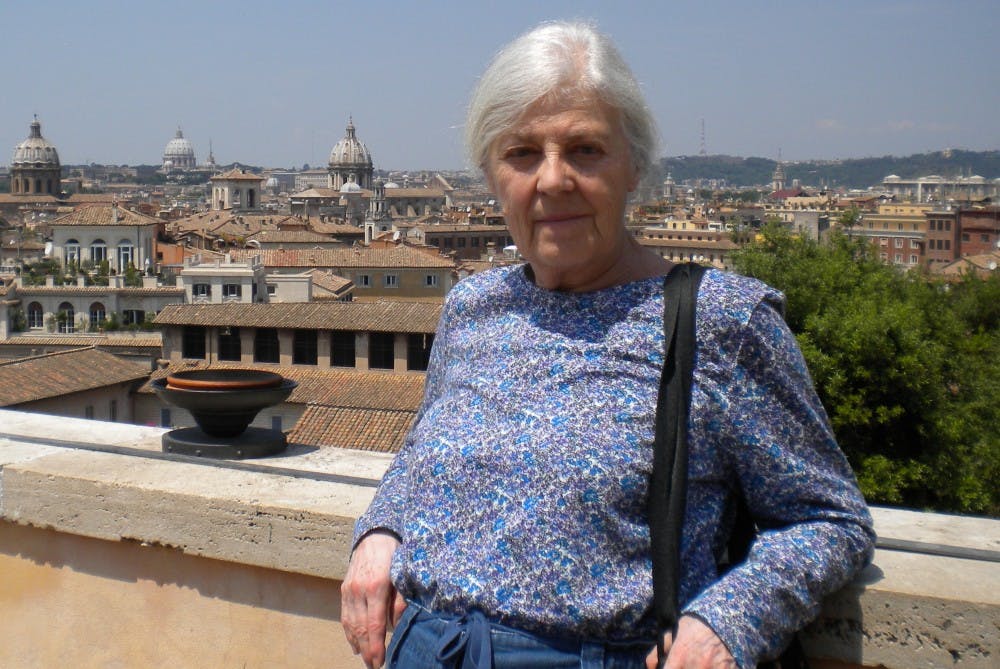Eleanor Winsor Leach, a professor in IU’s Department of Classical Studies, was found dead in her home last Monday. She was 80.
Her friends knew her as Ellie.
“She was someone whom one expected to live forever,” IU professor Mary Ellen Brown, a colleague of Leach’s, wrote in an email.
Leach is remembered by her students and colleagues as a quirky, grandmotherly Rome fanatic with a soft spot for Roman poet Horace and Roman politician Cicero.
Leach's daughter, Harriet Leach, 54, said her mother would start every visit by handing her a bag of apples, and she would end every visit by saying, "Oh, I had a very good time." It was like clockwork.
Eric Beckman, one of Leach’s graduate students, said she told him he could call her Ellie while they were on one of her frequent trips to Rome — but the nickname wasn’t to leave the city.
She was president of the American Philological Association, now known as the Society for Classical Studies, in 2005, and oversaw at least 26 dissertations during her time with IU’s classics department.
At the time of her death, she was working on a book about letter writing in Ancient Rome called “Epistolary Dialogues: Constructions of Self and Others in the Letters of Cicero and the Younger Pliny.”
Matthew Christ, chair of IU’s Department of Classical Studies, said the book’s manuscript is at the University of Michigan Press and will be printed posthumously.
Bernie Frischer, a professor of informatics at IU and friend of Leach's, credits her with pioneering an interdisciplinary field tying literature to physical remains and documents.
She was interested in seeing how visual renderings of scenes, like those found in the artwork preserved on Pompeii, were related to the descriptions of the same scenes found in classic literature, he said.
Christ said she was a pioneer in other ways, too, as a woman entering a male-dominated field in the 1960s. Teresa Ramsby, a former student of Leach’s, said despite all of this, Leach never liked the word "feminist."
“She was one of the first female classics professors to marry and have a child while she met the substantive demands of achieving tenure and, later, full professor,” Ramsby said.
Richard Owens, who was in one of the undergraduate courses he said Leach taught in fall 2008, said she challenged his perceptions of what he thought the classics were about, but always in a nurturing way.
He stayed in contact with Leach even after he decided to stop pursuing classics as his professional focus, and he said she supported him through the decision.
Beckman said she knew how to mold an environment where everybody felt like family.
“She was just an absolute treasure,” Beckman said.
Martin Shedd, a visiting assistant professor in IU's classics department, said Leach felt the department was hers to watch out for. She cared.
Shedd also said she had an extremely expressive face and would have been a terrible poker player.
Frischer said Leach was the stereotypical intellectual, living in a house surrounded by books and dust and devoted to the life of the mind.
Harriet Leach remembered how happy her mother was that the bathrooms in France were lavender-scented.
Owens and Beckman both remembered her inviting students over for dinner parties or out to have coffee and chat.
Beckman remembered how Leach would throw birthday parties for her favorite authors including Horace and invite her graduate students to celebrate at her house. Horace’s birthday is around Christmastime, so her students would help her set up her Christmas tree.
She cooked wonderful Italian food but was known to make her dinner guests engage in some academic discussion before eating, Frischer said.
Shedd said she loved classical music and operas and knew he liked that kind of thing, too, so she would often try to talk to him about operas he’d never seen.
Leach's daughter Harriet said her mother would often recap operas to her during their weekly Sunday phone call.
Christ remembered her sitting in her office on Saturdays with music from the Metropolitan Opera playing on her radio in the background. She worked seven days a week and never owned a television set.
Harriet Leach said the last time she watched a movie with her mother was when they saw Paddington during Christmastime in 2015.
They watched the movie in Leach's office in Ballantine Hall.
Shedd added outside of her finer tastes, Leach loved baseball.
She was known to call it “a more cerebral sport than football,” he said.
Another student of Leach’s, Kelly McClinton, was at the American Academy in Rome at the same time as Leach this past summer.
McClinton remembered the first day of a trip they took to Pompeii where she left the site around 1 p.m. and assumed Leach had too, but Leach stayed at the site — shoes in tatters from walking so much — until 5 p.m. when it closed for the day.
Harriet Leach said some of her favorite memories with her mother are from their trips to Italy in her youth, venturing to obscure houses and watching the guards of Pompeii clutch their skeleton keys.
"Pompeii was a place that we shared," she said.
She remembered her mother for her strength.
"There are people that are very strong in this world," Harriet Leach said, "but in my personal life I didn't known anyone as strong as Eleanor.”
Many of Leach's friends, students and colleagues agreed.
“I did think she would live forever,” Brown wrote.
A previous version of this article incorrectly stated Leach used to throw a brunch against the politicians who had Cicero executed. The IDS regrets this error.




